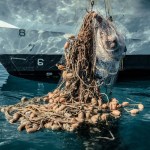Ghost Net Retrieval Operations Successfully Conclude in Vaquita Refuge
Published by Sea Shepherd Conservation Society

Sea Shepherd partners with local fishers to remove the marine debris threatening the survival of the world’s most endangered marine mammal.
San Felipe, BCN, Mexico – Nov. 3, 2020 – This week marks the completion of a collaborative effort aimed at removing abandoned fishing gear from the habitat of the critically endangered vaquita.
The program, which is funded by the Government of Mexico, has been operating since 2016. Every year, a group of small-scale fishers from the community of San Felipe in the Upper Gulf of California undertakes seasonal ghost net removal operations in the Vaquita Refuge. Sea Shepherd provides support with the recovery of the nets located by the fishers, ensuring that they never find their way back into the marine ecosystem.
“Ghost nets” refer to abandoned fishing gear, nets that have been discarded or lost at sea. These inactive nets pose a deadly threat to all marine wildlife and can continue to kill marine animals indefinitely for as long as they remain in the ocean. Whales, turtles, dolphins, and vaquitas are all vulnerable to entanglement in these deserted nets.
A group of 35 local fishers, working from 17 small boats, systematically search the Vaquita Refuge in a grid pattern to locate discarded fishing gear. Following GPS coordinates, the boats drag modified hooks under the water to detect submerged nets. As the vessels move over the nets, the hooks become entangled in the fishing gear. Once a net is detected, the fishers mark the area, and Sea Shepherd’s Sharpie moves in to retrieve the gear.
This season, the operation successfully retrieved 20 nets from the Vaquita Refuge between Sept. 12 and Oct. 31, 2020.
“There are many more nets in the water than vaquitas,” said Andrea Bonilla, Sea Shepherd’s Ghost Net Project Coordinator.
Scientists estimate that only 6-19 vaquitas remain alive, and the primary threat to the survival of the species is entanglement in fishing gear. The rare species of porpoise is endemic to the Upper Gulf of California, an area rife with poaching due to the illegal totoaba trade.
The Vaquita Refuge is a UNESCO-recognized and federally-protected area in which gillnet fishing is banned.
Sea Shepherd’s Sharpie remains in the Vaquita Refuge upon completion of this operation and is working with Mexican authorities to monitor the area, prevent poaching, and remove both active gillnets and ghost nets from the region.
“The last days of the Ghost Net Project turned up no nets, which means that the area has been effectively cleared of these abandoned, invisible curtains of death,” said Peter Hammarstedt, Sea Shepherd’s Director of Campaigns. “Thanks to the work of local fishermen, the Museo de la Ballena and Sharpie crew, we are starting Operation Milagro VII with a blank slate, ready to confiscate any new illegal fishing gear set to target the totoaba – and indirectly, the vaquita.”
Read the full article at: https://seashepherd.org/2020/11/03/ghost-net-retrieval-operations-successfully-conclude-in-vaquita-refuge/?utm_source=rss&utm_medium=rss&utm_campaign=ghost-net-retrieval-operations-successfully-conclude-in-vaquita-refuge



